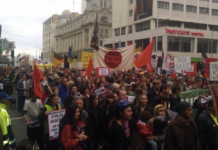Parliament Passes Bill Lacking Important Safeguards
“It’s highly concerning that Parliament has voted for the End of Life Choice Bill to become law, pending a referendum,” says Renée Joubert, Executive Officer of Euthanasia-Free NZ.
“The third reading would not have passed without NZ First’s bloc vote in favour.
“This euthanasia and assisted suicide Bill lacks important safeguards. For example, unlike the laws in Victoria, Canada and Oregon, this Bill does not require independent witnesses to be involved in any part of the assisted death process. The Bill does not require a cooling period. The list goes on.
Parliament rejected proposed amendments to include such safeguards without even debating them. Hon Maggie Barry proposed the inclusion of a cooling period of one week. Simeon Brown proposed that an independent witness should be present at a person’s death.
How many wrongful deaths, resulting from a lack of meaningful safeguards, are Parliament willing to accept?
We elect Members of Parliament to enact laws that would keep vulnerable people safe. This Bill, however, has significant loopholes that could enable coercion and abuse”, says Renée Joubert. Executive Officer of Euthanasia-Free NZ.
“It’s very disappointing that Parliament has passed the buck to the public,” she says.
A Curia Poll released earlier this week demonstrates that the majority of New Zealanders are confused about what the End of Life Choice Bill seeks to legalise – even though this Bill has been the subject of public debates and media attention for four years.
For example, 75% of respondents thought the Bill would legalise people choosing to have machines turned off that are keeping them alive, where in fact, this choice is already legal.
“We doubt that another year would be long enough to allow the public to become adequately informed about the Bill’s content, amid contentious debates on cannabis and the general election.
“We are concerned that a referendum result may not reflect the public’s true sentiments.”





